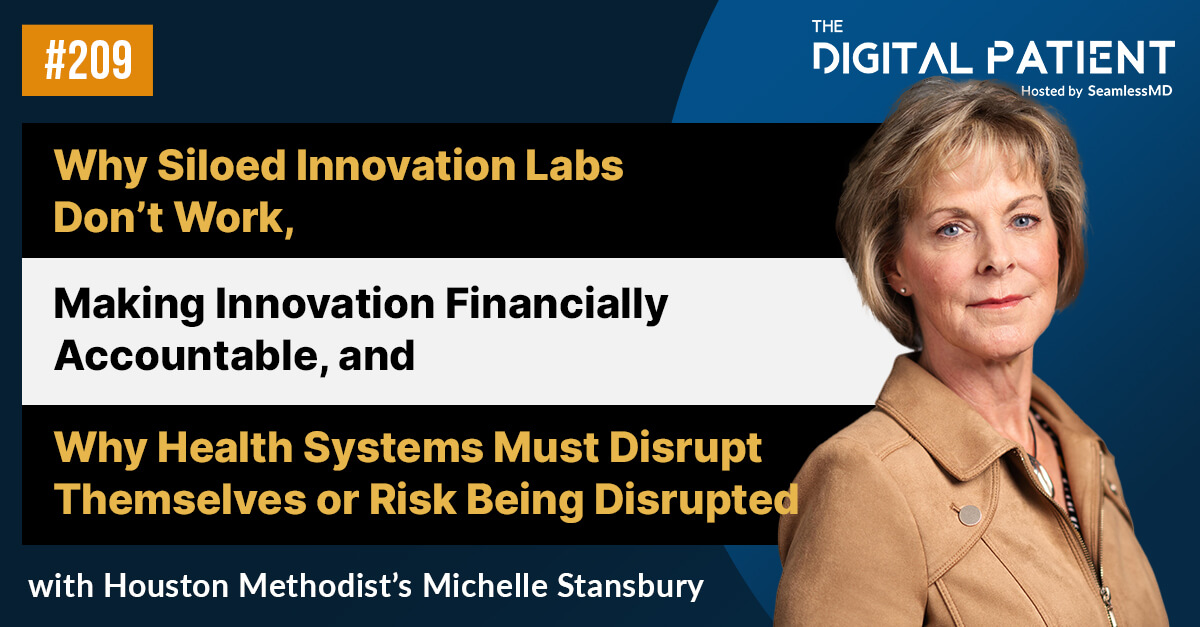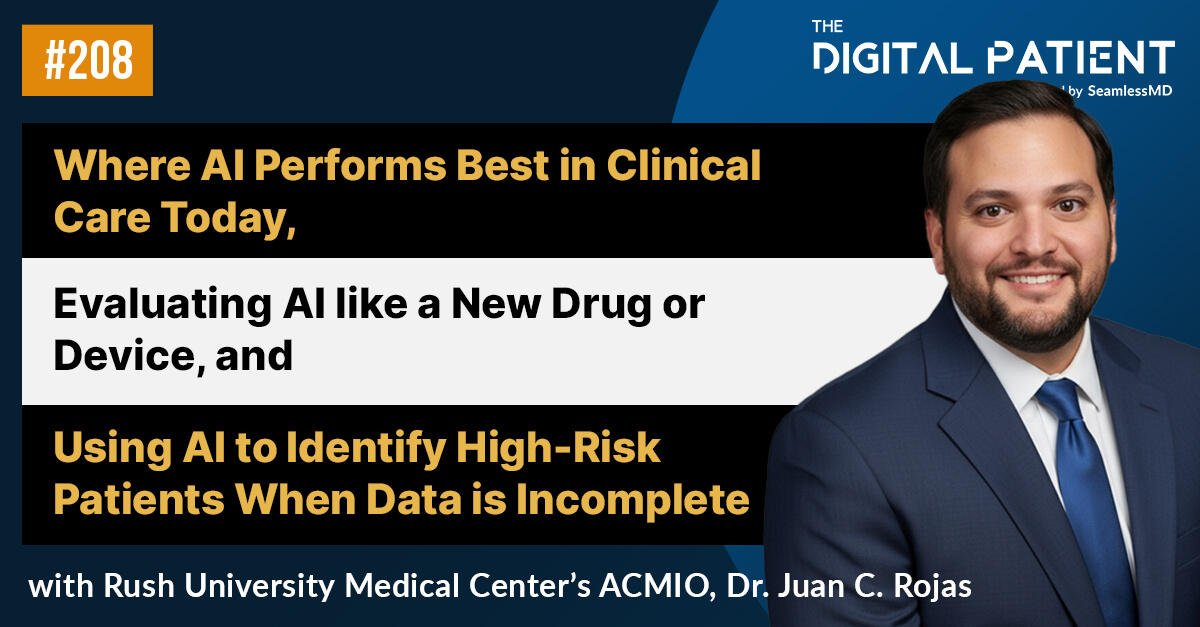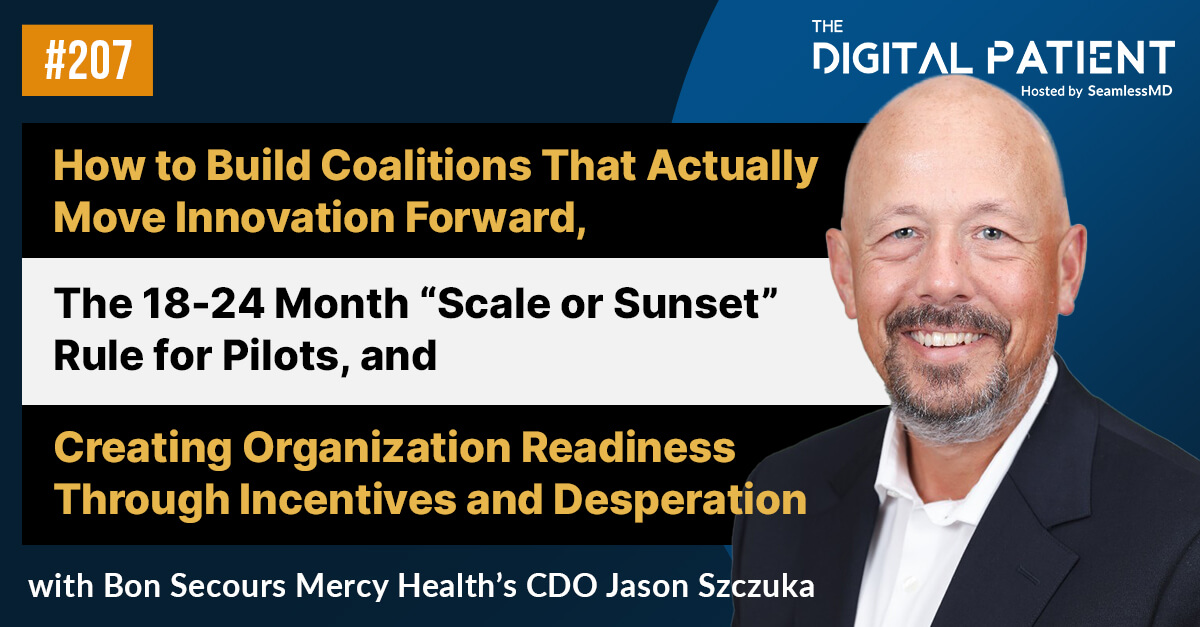Subscribe on: RSS | SPOTIFY | APPLE PODCAST | GOOGLE | BREAKER | ANCHOR
Video:
In this episode of the SeamlessMD Podcast, Dr. Joshua Liu, Co-founder & CEO at SeamlessMD, and marketing colleague, Alan Sardana, chat with Devin Gross, MBA, former CEO at Emmi Solutions and current Head of Portfolio Management at Primus, on "Pioneering Digital Patient Engagement". See the full show notes below for details.
Guest(s):
Mr. Devin Gross, MBA, former CEO at Emmi Solutions and current Head of Portfolio Management at Primus
Dr. Joshua Liu (@joshuapliu), Co-founder & CEO at SeamlessMD
Episode 30 – Show notes:
[0:30] Introducing Mr.Devin Gross, MBA, former CEO at Emmi Solutions & current Head of PortfolioManagement at Primus;
[1:36] Why Mr. Gross continuesto work in healthcare despite its many bureaucratic challenges, how he startedin hospital administration, and how he discovered that patients were the mostunderutilized resource by hospital administration;
[3:25] How digitalpatient engagement started back when streaming multimedia content had just startedto gain traction, and how Emmi Solutions was originally marketed as a riskmanagement solution;
[5:38] How patient consent& risk management remained prominent Emmi features as the product evolved;
[7:02] Why skeptics of health-techinnovation will always exist and how it’s the innovator’s opportunity to shapethe narrative by sharing strong positive feedback from physicians about digitalpatient engagement;
[11:20] How specificpolicy changes led to the gradual popularity of digital patient engagement,such as the introduction of readmission penalties and value-based care, as wellas some of the pitfalls which slowed innovation such as the 2008 financialcrisis and the “meaningful use guidelines”, which served as a checklist asopposed to driving patient engagement forward;
[13:30] Why it is most importantto clearly articulate how a product is going to help make money, save money ormeet a regulatory requirement in order to maximize interest from constituentswith limited resources;
[15:53] Why there is achallenge between helping patients and providing value to the investor/buyerand why it is important to focus on both without losing sight of the investor’sinterest;
[18:50] Why Mr. Gross believesdirect to consumer health-tech emerged due to misaligned incentives thatcorrupt the patient-provider relationship and why this relationship is the mostimportant long-term relationship since healthcare is complicated;
[24:05] How balancingproviding a higher quality patient experience with slower-moving financialincentives is a challenge and why it is important to articulate both sides of thestory (how a product benefits providers today as well as in the future);
[27:48] Why Emmi Solutionswas thought of as providing a medically relevant friend-to-friend conversationbecause of its empowering language and nurturing tone meant to change behavior,and how there is a disconnect between the information physician’s think the patientwants to know and what the patient actually wants to know;
[30:56] Why Mr. Grossbelieves digital “front-doors” as a patient acquisition strategy is a missedopportunity compared to viewing patients holistically as consumers with brandaffinities and lives outside of the acute experience as a patient;
[37:45] How patienteducation is a subset of patient engagement, where the purpose of patientengagement is to drive a behavior change or action (sign up for an appointment,weigh yourself, self-care, etc.) and education is to empower patients withinformation to ultimately support engagement;
[39:40] Why the democratization of data available online such as clinician ratings, outcomes, etc. is influencing consumer healthcare choice, and how digital patient engagement can (and will) evolve over time by creating more personalized experiences for patients;
[42:14] Fast Five / Lightning Round Questions:
Q1: What is your favorite book / bookgifted the most?
A1: Hippos Go Berserk! By Sandra Boynton, awonderful children’s book that I read to my kids.
Q2: What is your favorite movie / TV show?
A2: The Watchmen on HBO Max, based off of thecomic book series of the same name.
Q3: What is something in healthcare youbelieve that others may find insane?
A3: The fact that the system makes more moneywhen you’re sick than when you’re well, the fragmented system full ofindividual contractors that lead to people having a ton of bills,
Q4: Would you rather have super strength,super speed, or be able to read people’s minds?
A4: Absolutely the ability to read minds!
Q5: What is one hobby/activity you’vegotten into since the pandemic started?
A5: I’ve become a Peloton junkie!
.svg)









.png)
